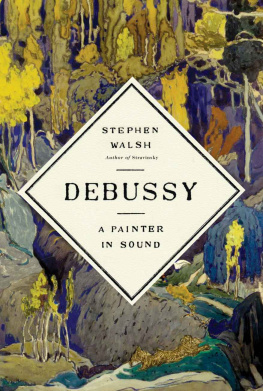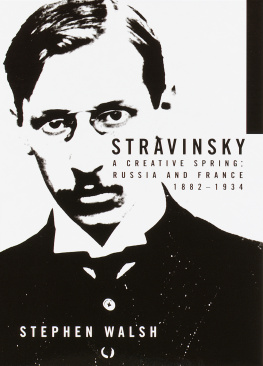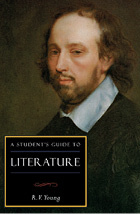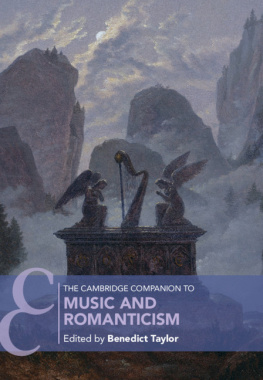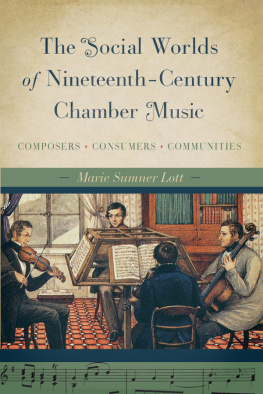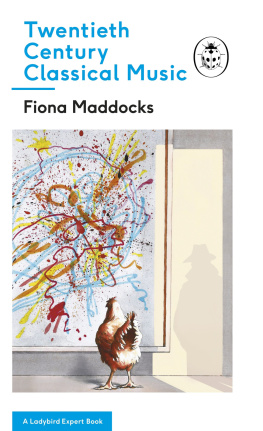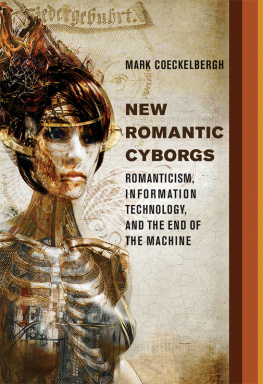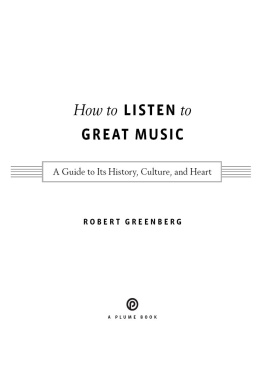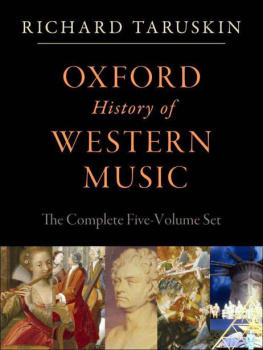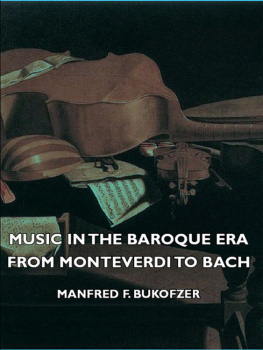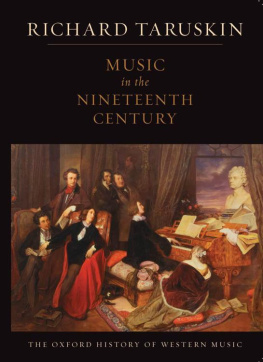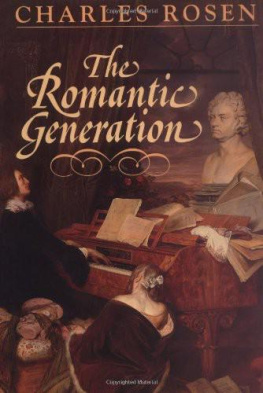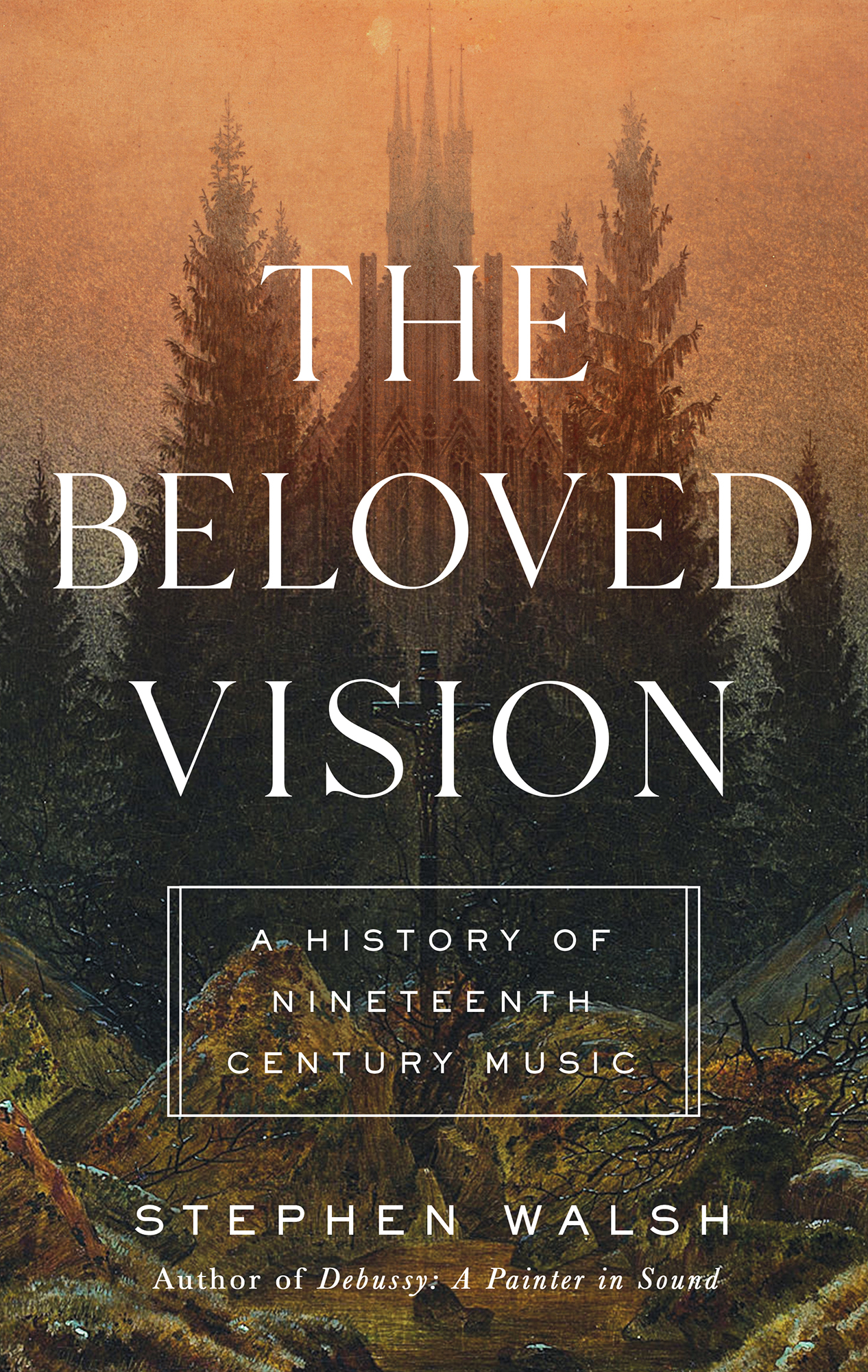Contents
Guide
The Beloved Vision
A History of Nineteenth Century Music
Stephen Walsh
Author of Debussy: A Painter in Sound
For Mary:
Die geliebte Gestalt
Acknowledgements
Family and friends have helped the book along in various ways. David Wyn Jones fed me information on Beethoven and the Vienna of his day; Robin Holloway, one of the most stimulating musical conversationalists I know, kept my ideas under firm scrutiny in long phone conversations; the late Bryan Magee talked to me about early-nineteenth-century philosophers and, of course, Wagner, and I have also been helped in the matter of Wagner by Barry Millington and Lionel Friend. Clare Hammond alerted me to the existence and significance of Hlne de Montgeroult. My wife, Mary, kept a firm check on my more wayward theorising, rightly insisting that good questions are more important than facile answers. My Faber editor, Belinda Matthews, has as ever provided massive support and encouragement, backed up by Anne Owens wonderful team of copy editors and proof-readers, Sam Matthews and Kate Hopkins, fact-checker extraordinaire. Chuck Elliott and Leo Walsh kindly read the manuscript and constantly reassured me that the book was worth writing. But in the end everything herein is my own fault.
Welsh Newton,
June 2022
INTRODUCTION A Difficult and Dangerous Undertaking
On the wall of the music-room of my childrens prep school in deepest Herefordshire in the 1990s was one of those time-line charts that simulate the flow of history in the form of a polyphony of overlapping lines. Music history began sparsely with Protin, Machaut, Dufay, then broadened out into the Renaissance Josquin, Palestrina, Victoria, Tallis, Byrd, etc.: a well-populated era, it seemed. The seventeenth and eighteenth centuries, likewise, were busy times for music. But as the eighteenth century faded into the nineteenth there was a curious lull. In 1800, it turned out, there were only two composers worth mentioning: Haydn, still clinging on, and otherwise only Beethoven, thirty years old and monarch of all he surveyed. A few years into the new century things picked up again, but for a few short years it looked as if music history had practically died out, preserved only in the musical Noahs Ark by a single pair of composers.
Beethovens superiority was certainly no myth. It was recognised in his own day by composers, performers, patrons and musical institutions all over Europe and even, from quite early on, America. In 1803, the Paris piano manufacturer Sbastien rard sent him a piano as a gift that was also, of course, a promotional exercise. By 1808 Beethovens reputation outside Austria was so great that Napoleons brother Jrme Bonaparte, the so-called king of Westphalia, invited him to take up the post of Kapellmeister in Kassel at a tempting salary of six hundred ducats (some sixty thousand pounds in todays money), while in Vienna his standing was such that a trio of aristocratic patrons put up an equivalent annuity to stop him leaving.
Above all, Beethovens fame tended to act as a magnet for sweeping historical classifications, both in his lifetime and in the years that followed. Most notorious was E. T. A. Hoffmanns description of him, in a contemporary review of the Fifth Symphony, as a purely Romantic, and therefore truly musical, composer (because, for Hoffmann, music was the most Romantic of all arts one might almost say the only one that is purely Romantic). Admittedly, Hoffmann also considered Haydn and Mozart to be Romantic, though his verbal portraits of their music suggest that their romanticism was largely in the mind of the writer. Haydns symphonies, for example, lead us through endless, green forest-glades, through a motley throng of happy people. Youths and girls sweep past dancing the round a world of love, of bliss, of eternal youth, as though before the Fall; no suffering, no pain; only sweet melancholy longing for the beloved vision floating far off in the red glow of evening. Mozart, on the other hand, leads us deep into the realm of spirits. Dread lies all about us, but withholds its torments and becomes more an intimation of infinity. Hoffmann, as well as being one of the great novella and short-story writers of his day, was himself a composer and a knowledgeable music critic. His best-known opera, Undine (1816), though disappointing for anyone looking for the sources of Romantic music in the literary world of the early 1800s, is important as the first in a line of operas, songs and (eventually) instrumental works about water sprites who marry mortals against the best fairy advice and suffer the bitter consequences. There will be more to say about fairies; but it seems reasonably safe to assert, at this stage, that they are not a significant component of Beethovens music.
So does it make sense, at the start of a book about Romantic music, to think of Beethoven and his immediate predecessors as in this or any other sense Romantic? The answer is clearly yes, but only because the idea of romanticism is something altogether broader and richer than might be deduced from Hoffmanns superbly imaginative definitions. To get at some kind of satisfactory image of what this much abused expression might signify in its particular application to music, we have somehow to get away from the habit of imposing on music our own emotional predilections and try to understand the nature and historical context of the phenomenon itself. After all, Hoffmanns description could just as well apply to Monteverdi, Handel or Bach, or even Josquin des Prez or Palestrina, as to composers like Schumann or Berlioz or Wagner, of whom he naturally knew nothing but whom we think of as Romantic. His idea of music as the most purely Romantic art plainly comes from the fact that instrumental music, at least, lacks overt subject matter and therefore lends itself to having subject matter thrust upon it in the privacy of the listeners mind. We can swoon to Brahms or Tchaikovsky, but we can also swoon, perhaps less dramatically, to Handel or Vivaldi. But if all Romantic means is having the capacity to set us all swooning, we might as well pass on to some more interesting topic. Luckily, there is a little more to it than that.
It has seemed to me that the best way of exploring this complicated question would be through the entirely enjoyable process of writing a narrative history of what most of us think of as the Romantic epoch, very broadly defined; enjoyable, of course, because a lot of the research involved would be simply listening to an immense amount of music, including a good deal that, quite frankly, I had not heard before, and some that I barely knew existed. The nineteenth century was crucially a time of stylistic diversity, a time when a composer asserted his or her existential being through a recognisable, even idiosyncratic musical language, after several centuries during which composers were generally less concerned with self than with craftsmanship, and individuality emerged almost by accident, in small turns of phrase rather than wholesale linguistic contrasts. This is much truer for music than for literature, because music is less restricted by semantics; truer perhaps than for the visual arts, which, in the nineteenth century, were still largely tied to representation, or for the architectural design of buildings, which, after all, had to be lived in and to stay up.
Even within its seemingly rather strict grammatical rules, music turned out to be the most naturally deviant art form; the textbook rules proved less limiting than had been thought and could be broken without much damage as long as a coherent framework were preserved and could be perceived. I dont want to characterise Romantic composers as a procession of irresponsible tearaways. All the composers in this book were conscientious artists who knew what they were doing and who took the risks they took with a clear intention and an understanding of the always precarious balance between expression and technique. But risk-taking the braving of the unknown was certainly an important part of what they wanted to do, and that is as true of Chopin and Verdi as it is of Berlioz and Wagner. Perhaps one can say that the riskiest thing of all for an artist, the baring of the soul in language that might collapse under the weight of its own emotion, is an essential part of Romantic music, independent of categories and ostensible subject matter. But it is certainly not the only part. The new, the original, the unexpected, the beautiful, the sublime, but also the intimate and domestic, what Germans call the


